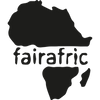
Invest
Klima-Darlehen
Das Klima-Darlehen
Klimapositive Schokolade
Gut für den Planeten & Dich
Da die Nachfrage sehr hoch ist, findest Du hier das neue Klima-Darlehen, in das Du investieren kannst.

Bio-Kakao aus Dynamischen Agroforst
fairafric kann langfristig bis zu 4x so viel CO2 im Boden speichern, wie in der gesamten Wertschöpfungskette ausgestoßen wird.
Oben ein Bild von einer DAF-Farm unseres Partners Serendipalm.
(Copyright: Courtesy of Serendipalm and Dr. Bronner’s)
Die ersten Mengen Bio-Kakao aus DAF hat fairafric in 2024 gekauft.
Über 500 Kakaofamilien nehmen an der DAF Initiative bereits Teil.


Der Weg zur Klimapositivität von fairafric
Klimapositiv bedeutet, dass mehr klimaschädliche Emissionen (z.B. CO2) und Auswirkungen gebunden als verursacht werden.
Das Ziel von fairafric ist es, die Erde in einem besseren Zustand zu hinterlassen, als sie vor unserer Tätigkeit war. Dabei geht es uns nicht nur um CO2, sondern unter anderem auch um Bodenfruchtbarkeit, Wasserspeicherung, eine möglichst hohe Biodiversität von Pflanzen und Tieren, Resilienz gegenüber dem Klimawandel und die Herstellung von gesunden Produkten.
Die Anbaumethode Dynamischer Agroforst (DAF) basiert auf dem Wissen der indigenen Völker Lateinamerikas und vereint viele Elemente der regenerativen Landwirtschaft oder Permakultur. Die Pflanzen werden in verschiedenen Ebenen (Sträucher, Halbstämme, etc.) des Waldes angebaut und es werden verschiedene lokale Baumarten gepflanzt: Nutzpflanzen, Biomassebäume, Schattenbäume usw. Ein Hauptziel ist es, viel Biomasse zu produzieren, um die Bodenqualität zu verbessern. Daher wird nicht nur Kakao angebaut, sondern auch andere Baum- und Pflanzenarten wie Cashew, Mango, Ananas usw., die von Fairafric verarbeitet werden können. Durch die Erzeugung von Biomasse wird langfristig eine große Menge CO2 gebunden. Deutlich mehr als in der gesamten Wertschöpfungskette von fairafric emittiert werden.
fairafric stößt dank der eigenen solarbetriebenen Fabrik deutlich weniger Emissionen aus als andere Schokoladenhersteller. Dennoch werden unvermeidbare Emissionen (u.a. in der Logistik) verursacht. Diese wurden bisher durch Unterstützung von Klimaprojekten in Westafrika kompensiert.
Unser großes Ziel ist es allerdings in der eigenen Wertschöpfungskette, die Umwelt besser zu hinterlassen als wir sie vorgefunden haben.
Deshalb werden wir ab 2024 unseren Kakao aus einem Dynamischen Agroforst (DAF) Projekt in Ghana beziehen. Nach ersten externen Analysen von Experten kann fairafric damit 4x so viel CO2 langfristig im Boden binden, wie in der Wertschöpfungskette emittiert wird!
Kakao ist eine der wichtigsten Cash Crops in Westafrika. Aus Mangel an Alternativen und um ein Einkommen für die Familie zu erwirtschaften, wird oft ein Gebiet gerodet und dann möglichst viele Kakaobäume auf dem Stück Land angepflanzt. Nach einigen Jahren intensiver Bewirtschaftung sind die Nährstoffreserven im Boden erschöpft und ein hoher Einsatz von Kunstdünger und Pestiziden ist notwendig. In Ghana ist der konventionelle Kakaoanbau für die Abholzung von 25% des Regenwaldes verantwortlich.
Durch die Abholzung des Regenwaldes werden große Mengen CO2 freigesetzt. Durch den Anbau von Monokulturen und den massiven Einsatz von Pestiziden verschlechtert sich zudem die Bodenqualität und es kann weniger Wasser und Kohlenstoff gebunden werden.
Der fortschreitende Klimawandel wiederum führt zu stark veränderten Wetterbedingungen und einer Häufung von Klimakatastrophen. Da die Kakaobäume im konventionellen Anbau eine deutlich geringere Widerstandsfähigkeit aufweisen, kommt es bereits heute zu Ernteausfällen bei konventionellem Kakao, während die Erträge bei regenerativen Anbaumethoden wie DAF kaum beeinflusst werden, da die Pflanzen gesünder sind und eine hohe Resilienz aufweisen.
Der Kakaobaum ist ein Schattengewächs. Das bedeutet, dass der Kakaobaum größere Bäume (z.B. Palmen) über sich braucht, die ihn beschatten und ihm helfen, optimal zu wachsen und gedeihen zu können. Bei DAF wird daher darauf geachtet, dass die Bäume und Pflanzen neben den Kakaobäumen stehen, genügend Schatten spenden und die Nährstoffe liefern, die der Kakaobaum benötigt. Für diese Symbiose ist eine möglichst große Vielfalt an Pflanzen notwendig. Diese Symbiose fördert die Biodiversität, steigert den Ertrag pro Baum, erhöht die Bodenfruchtbarkeit und die Wasserspeicherkapazität des Bodens und die Biomassebäume speichern aktiv CO2 in der Erde.
Externe Experten haben in ersten Analysen ermittelt, dass durch die
Speicherung der Biomasse im Boden fairafric bis zu 4x mehr CO2 langfristig im
Boden speichern kann, als in der gesamten Wertschöpfungskette emittiert wird.
Mittels unserem neuen Visitor Center wollen wir auch unserer Kundschaft die Möglichkeit geben, einen tiefen Blick in unsere Betriebsabläufe zu erhalten. Der Fabrikbesuch wird mit einem Besuch unserer Farmer*innen-Communities verbunden, alles an einem Tag! Einmalig in der Welt!
1. Höhere Kakaoprämie
fairafric zahlt den Bäuerinnen und Bauern zusätzlich zur höchsten Bioprämie (692$/MT) in Westafrika eine Klimaprämie von 150$/MT. Dies ist ein Vielfaches der regulären Bioprämie oder anderer Zertifizierungen wie Fairtrade.
2. Diversifizierung des Einkommens
Der Anbau mehrerer Nutzpflanzen hilft, das Einkommen zu diversifizieren und ermöglicht es, auch außerhalb der Kakaoerntezeit ein Einkommen zu erwirtschaften.
3. Bessere Bodenqualität & Resilienz gegenüber dem Klimawandel
Durch die Verbesserung der Bodenfruchtbarkeit und andere Vorteile von DAF für den Boden werden die Pflanzen deutlich kräftiger und widerstandsfähiger gegen Umwelteinflüsse. Zudem erhöht die Bodenqualität die Qualität und den Ertrag der Früchte. So können die Flächen langfristig und nachhaltig auf natürliche Weise bewirtschaftet werden.

Seit 2020 steht unsere Schokoladenfabrik im ländlichen Ghana
Häufige Fragen zu fairafric
2015
Erste offizielle Treffen zwischen Hendrik und Kakaofarmer*innen und Kakaoverarbeiter*innen in Ghana.
2016
Erste Kickstarter Kampagne
Gründung fairafric GmbH
Erste Produktion
2017
Zweite Kickstarter Kampagne
Erfolgreiche Bio-Zertifizierung der gesamten Wertschöpfungskette
Start der Zusammenarbeit mit Yayra Glover Ltd.
Umstieg von 20g Tafeln auf 100g Tafeln
2018
Dritte Kickstarter Kampagne
Zertifizierung Klimaneutral (sowohl Schokolade als auch Unternehmen)
Gründung fairafric Stiftung, die Anteile an der fairafric GmbH für Kakaofarmer*innen hält
Erste Seedrs Kampagne (Seedrs ermöglicht es Startups, ihre Kundschaft als Anteilseigner*innen zu gewinnen), in der sich 264 Privatpersonen an fairafric beteiligt haben
2019
Beschluss, eine größere Schokoladenfabrik in Eigenregie zu bauen: Auf dem Land der Kakaokooperative, mit der wir zusammenarbeiten, in der ländlichen Region, wo auch die Kakaobohnen wachsen.
Anstieg der Anteilseigner*innen auf 360; Einstieg von Ludwig Weinrich und claro fairtrade AG in die fairafric Familie
Gewinn des Lammsbräu Nachhaltigkeitspreises
2020
Bau unserer neuen Schokoladenfabrik in Amanase. Rekordverdächtige Bauzeit von 5,5 Monaten von Spatenstich bis zur ersten Tafel.
2021
Aus der fairafric GmbH wird die fairafric AG. Innerhalb von 3 Tagen ist die erste Wandelanleihe mit 990.000€ vollgezeichnet und bereits innerhalb von 24 Stunden ist die erste Aktienemission über 999.589,80€ von fairafric ausverkauft. fairafric kauft 250 Tonnen Kakaobohnen für die Produktion in 2021 und bezahlt hierbei die höchsten Prämien in Westafrika. fairafric jagt außerdem in 2021 von Rekord zu Rekord. fairafric übertrifft den Vorjahresumsatz um mehr als das doppelte und produziert über 2.000.000 Tafeln Schokolade.
2022
Nach einem herausragenden ersten Quartal in 2022, verhindern die makroökonomischen Schocks
ein weiteres Wachstum von fairafric. Doch während viele andere Marken mit
Umsatzrückgängen und Auslistungen zu kämpfen haben, bleibt fairafric in allen
Märkten präsent und gewinnt stark an Marktanteilen.
fairafric erreicht zudem das Finale des Deutschen Nachhaltigkeitspreis 2022 und wird als eines der nachhaltigsten Unternehmens Deutschland ausgezeichnet.
2023
fairafric steigt mit einer eigenen Schokoladendrops-Linie in das B2B-Geschäft ein. Die Schokoladentropfen werden unter anderem von Großbäckereien oder Keksherstellern in ihren Produkten verwendet und die Anlage läuft bereits nach kurzer Zeit rund um die Uhr.
fairafric bringt eine vegane Milchschokolade auf Cashew-Basis auf den Markt, die ein voller Erfolg wird und sich zu einem der meistverkauften Produkte entwickelt.
fairafric erhält die ersten größeren Aufträge für Auftragsproduktionen und startet die Produktion für den ersten Kunden in den USA.
2024
fairafric bezieht die ersten kleineren Mengen Kakao von Serendipalm aus Dynamischen Agroforst.
Die Eigentümer von fairafric sind das Gründerteam, unsere 1142 Anteilseigner*innen aus dem Kundenkreis, die Ludwig Weinrich GmbH und die claro fair trade AG sowie unser Team und die Kakaofarmer*innen unserer Partner Kooperative.
Im Jahr 2024 werden wir zum ersten Mal Bio-Kakao aus einem dynamischen Agroforst Projekt in Ghana beziehen, um einen noch größeren ökologischen Mehrwert zu erzielen und die höchste Bioprämie an unsere Farmer*innen zu zahlen.
Zusätzlich möchte fairafric die Pflanzung und Umwandlung von weiteren Farmen zu DAF fördern und die Erträge von bereits bestehenden DAF Farmen zu steigern.
Jeder investierte Euro bindet langfristig CO2 im Boden und schafft Arbeitsplätze in Ghana!
Ab Ende 2025 werden wir operativ voraussichtlich profitabel arbeiten. Da wir mit dem Umstieg auf Bohnen aus Dynamischen Agroforst einige Anlaufkosten haben und unsere Zutatenlager und Zwischenlager erheblich ansteigen müssen, um das anstehende Wachstum zu ermöglichen, kalkulieren wir bis dahin mit einem Minus.
Mittels unserem neuen Visitor Center wollen wir auch unserer Kundschaft die Möglichkeit geben, einen tiefen Blick in unsere Betriebsabläufe zu erhalten. Der Fabrikbesuch wird mit einem Besuch unserer Farmer*innen-Communities verbunden, alles an einem Tag! Einmalig in der Welt!
Häufige Fragen zum Nachrangdarlehen
Für jede 1.000€ die Du uns heute leihst, bekommst Du jedes Jahr 67,50€ Zins.
Die Rückzahlung beginnt im Januar 2028 und erfolgt in 10 Raten (je 2 Zahlungen pro Jahr im Januar und Juli) bis zum Ende der Laufzeit (Juli 2032). Ab Januar 2028 erhältst Du daher eine gleichbleibende Zahlung bestehenden aus Zins und Rückzahlung (eine sogenannte Annuität) von 121,13€ pro 1.000€ investierter Betrag.
Am Ende erhältst Du für 1.000€, die Du investierst 1.355,74€ zurück.
Die Kampagne läuft so lange, bis 999.000€ gezeichnet wurden.
Die erste Klima-Anleihe von fairafric, ist innerhalb kurzer Zeit ausverkauft gewesen. Daher gehen wir davon aus, dass es schnell zu einer Vollzeichnung kommt. Wir bearbeiten die Zeichnungen nach deren Eingangszeitpunkt.
Wir teilen keinem Finanzamt Informationen über unsere Anleger*innen mit. Ihr gebt bei Eurer Steuererklärung einfach erhaltene Zinsen an.
Wer uns Geld zinsfrei leihen will, schreibt uns eine kurze E-Mail. Das geht natürlich auch und unterstützt uns noch mehr.
Da das Darlehen unbesichert begeben ist, kann es zum Totalverlust Deiner Anlage kommen.
Investiere daher auf gar keinen Fall Geld, dass Du unbedingt brauchst.
Was ist der Unterschied zwischen DAF und konventionellen Kakao
Das Management Team in Ghana
Michael Marmon-Halm
Managing Director Ghana
Michael bringt mehr als 12 Jahre Erfahrung in der Kakaowirtschaft in Ghana mit und hat Qualitätsmanagement studiert.
Griselda Esther Ossei
Chief of Staff
Griselda bringt viel Erfahrung im Accounting mit und unterstützt in der strategischen Planung und Umsetzung rund um die Marke fairafric, das Marketing, das HR und Operations in Ghana.

Henry Langma
Operations Manager
Henry leitet den Bereich Operations (Produktion, Technik, Logistik) bei fairafric und hat bereits mehrere kakaoverarbeitende Fabriken in Ghana erfolgreich aufgebaut.
Audrey Marmon-Halm
Quality Manager
Unsere Quality Managerin Audrey bringt 11 Jahre Berufserfahrung in der Qualitätskontrolle und Qualitätssicherung mit.
Das Management Team in Deutschland










